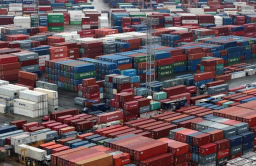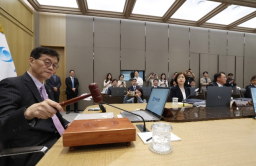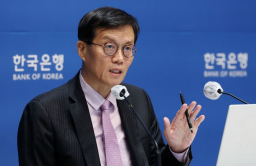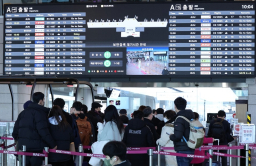-
KOSPI 2577.27 -2.21 -0.09%
-
KOSDAQ 722.52 -7.07 -0.97%
-
KOSPI200 341.49 +0.02 +0.01%
-
USD/KRW 1396 -2.00 0.14%
Korea inflation at 19-mth low; casts doubts over rate hike
Economy
Korea inflation at 19-mth low; casts doubts over rate hike
Government bond yields fall as the economy is expected to stay sluggish on sustained falls in exports
By
Jun 02, 2023 (Gmt+09:00)
2
Min read
News+
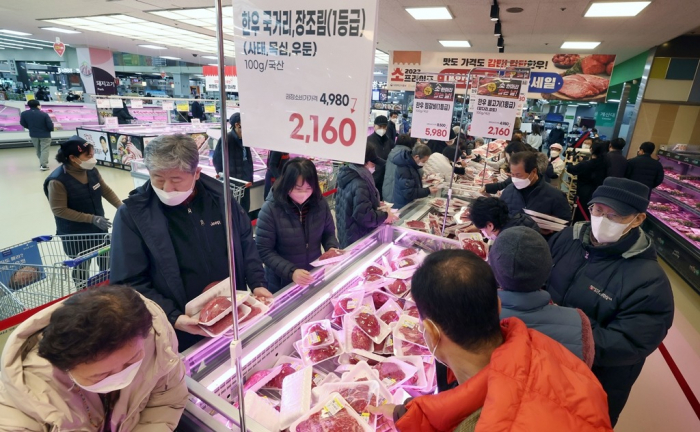
South Korea’s headline inflation fell for a fourth straight month in May to a 19-month low amid continuous signs of a slowdown in Asia’s fourth-largest economy, casting doubts over whether the central bank will further raise interest rates.
Consumer prices rose 3.3% last month year-on-year, the slowest since October 2021, government data showed on Friday. That compared with 3.7% in April, 4.2% in March and 4.8% in February versus the same period a year earlier.
Petroleum product costs skidded 18% in May on-year as oil prices declined.
Annual core inflation, which strips out volatile food and energy prices, dipped to 3.9%, the lowest since July 2022, indicating easing price pressure in the local economy.
After the data release, government bond yields fell across the board in the morning. The highly liquid three-year debt yield fell 3.6 basis points to 3.442% and the five-year bond yield also slumped 3.6 bps to 3.428%, according to the Korea Financial Investment Association.
Those yields jumped after Bank of Korea Governor Rhee Chang-yong left the door open for further tightening last week, saying the central bank’s decision to keep its base rate steady at 3.50% does not signal the end of its rate hike cycle.
AVERTS RECESSION, STILL SLUGGISH
The economy expanded by a seasonally adjusted 0.3% in the first quarter from the previous quarter, revised central bank data showed, matching its earlier estimate released in April.
Private consumption rose 0.6%, led by strong spending on leisure and tourism, higher than an advance estimate of 0.5% growth. But facility investments declined 5%, more than an earlier assessment of a 4% drop.
Korea's trade-dependent economy is expected to stay sluggish as exports fell for the eighth consecutive month in May.
Overseas sales slumped 15.2% to $52.2 billion from a year earlier as weak global chip demand dragged the country’s semiconductor exports down 36.2%, according to data from the Ministry of Trade, Industry and Energy on Thursday. Korea is home to the world’s two largest memory chipmakers – Samsung Electronics Co. and SK Hynix Inc.
Exports of petroleum and petrochemical products dropped 33.2% and 26.3%, respectively.
Shipments to China, the country’s top overseas market, fell 20.8% on a slower-than-expected rebound in the world’s second-largest economy, the ministry said.
“Korea’s exports are unlikely to show a significant rebound until the third quarter,” wrote Shinhan Securities Co. in a research note, adding that demand is slowing in developed countries.
A recovery in the Chinese economy is likely to accelerate only in the fourth quarter when demand for IT products is predicted to revive, the brokerage house said.
Some economists, however, said Korean exports started showing a sign of recovery as daily exports in May hit a seven-month high.
Overseas sales last month averaged $2.4 billion daily, the largest since October 2022, according to ministry data.
“Korean exports are likely to bottom out and rebound during the current quarter,” said Lim Hye-yoon, an economist at Hanwha Investment & Securities Co. in a note.
Write to Se-Min Huh and Jin-gyu Kang at semin@hankyung.com
Jongwoo Cheon edited this article.
More To Read
-
Jun 02, 2023 (Gmt+09:00)
-
May 25, 2023 (Gmt+09:00)
-
May 26, 2023 (Gmt+09:00)
-
Apr 25, 2023 (Gmt+09:00)


